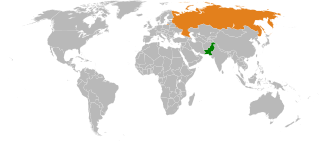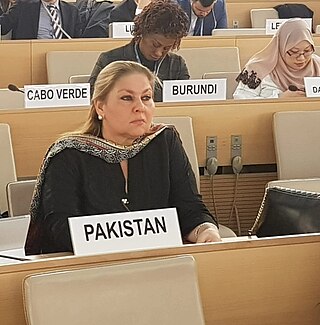
Islamabad is the capital city of the Islamic Republic of Pakistan. It is the country's ninth-most populous city with a population of over 1.2 million people and is federally administered by the Pakistani government as part of the Islamabad Capital Territory. Built as a planned city in the 1960s and established in 1967, it replaced Karachi as Pakistan's national capital.

Quaid-i-Azam University Islamabad, founded as University of Islamabad, is a public research university in Islamabad, Pakistan.

The Higher Education Commission is a statutory body formed by the Government of Pakistan which was established in 2002 under the Chairmanship of Atta-ur-Rahman. Its main functions are funding, overseeing, regulating and accrediting the higher education institutions in the country.

The Institute of Space Technology is a public university located in Islamabad, Pakistan. It is focused on the study of astronomy, aerospace engineering, avionics engineering and astronautics.

Jinnah Sports Stadium is a multi-purpose stadium in Islamabad, Pakistan. It is currently used mostly for football matches. The stadium has a capacity of 49,000 people and is the largest stadium in Pakistan.
The Quaid-i-Azam Academy is an institution of the Pakistan Government to promote the study and understanding of the personality and work of Quaid-i-Azam Muhammad Ali Jinnah, his associates, the Pakistan Movement and of the various aspects of Pakistan.

Shireen Mehrunnisa Mazari is a former Pakistani politician who served the Federal Minister for Human Rights, from 20 August 2018 to 10 April 2022. She is the chairperson of the Parliamentary Committee on Appointment of Chief Election Commissioner and Members of the Election Commission of Pakistan. She has been a member of the National Assembly of Pakistan since August 2018, and served as a chief whip for Pakistan Tehreek-e-Insaf. Previously, she was a member of the National Assembly from June 2013 to May 2018.

Abdul Rashid Ghazi was a Pakistani Islamic fundamentalist who served as the vice-chancellor of Faridia University. Prior to his death, he served as a diplomat for UNESCO. He was the son of Muhammad Abdullah Ghazi, and younger brother of Abdul Aziz Ghazi.

The Pakistan Monument is a national monument and heritage museum located on the western Shakarparian Hills in Islamabad, Pakistan. The monument was constructed to symbolize the unity of the Pakistani people. It is dedicated to the people of Pakistan who sacrificed their "today" for a better "tomorrow".

The Soviet Union and Pakistan first established the diplomatic and bilateral relations on 1 May 1948.

Pakistan–South Korea relations refers to bilateral diplomatic relationship between Pakistan and South Korea. Since the 1980s, the relations between the two Asian states have improved and periodically enhanced. Pakistan has an embassy in Seoul, South Korea, and South Korea has an embassy in Islamabad, Pakistan. Pakistan is one of the few countries that has good relations with both North Korea and South Korea.

Muhammad Azam Khan Swati is a Pakistani politician and businessman who served as the Minister of Narcotics Control and Railways from 2020 to 2022. He is the elected senior vice president of the Pakistan Tehreek-e-Insaf. He belongs to Swati tribe of Mansehra.

Majlis Wahdat-e-Muslimeen is a Pakistani Shi'a Islamic political organization. Its headquarters are in Islamabad. MWM Pakistan works to establish an Islamic democratic welfare state, particularly emphasising Shi'a-Sunni unity.

Margalla Railway Station is located between Khayaban-i-Jauhar and Service Road North in Islamabad, Capital Territory, Pakistan. The entrance to the station is from Khayaban-i-Jauhar side.

Rabiya Javeri Agha is the Chairperson of the National Commission for Human Rights (NCHR) in Pakistan, and a retired civil servant officer who served in the Government of Pakistan in BPS-22 grade as Federal Secretary. She was the first unanimously elected female President of the Pakistan Administrative Service (PAS) Officers Association, and she has had an extensive career ranging from human rights, women's development, sustainable tourism, energy, finance and trade.

The Information Technology University (ITU) is a public university in Lahore, Punjab, Pakistan. Founded in 2012, the university was founded and headed by Umar Saif and is modeled after the MIT.
Pakistan has a significant market for hybrid vehicles such as Honda's Vezel, Toyota's Prius, and Aqua. The Automotive Development Policy (2016–2021) and the launch of the China-Pakistan Economic Corridor (CPEC) encourage foreign investments for new automobile brands to enter the Pakistani market, while the leading manufacturers in the automobile industry in Pakistan are interested in introducing electric vehicle (EV) models with a wide range of prices for consumers of diverse income groups. Several members of the international automobile industry including South Korea, China, and Japan also believe that Pakistan has a high potential market for EV technology, leading them to collaborate with local businesses to bring EVs to Pakistan.
Cynthia D. Ritchie is an American filmmaker, analyst, and social media campaigner who has been living in Pakistan since 2010. Ritchie has campaigned through social media to uplift the overall image of Pakistan.
Web3 is an idea for a new iteration of the World Wide Web which incorporates concepts such as decentralization, blockchain technologies, and token-based economics. Some technologists and journalists have contrasted it with Web 2.0, wherein they say data and content are centralized in a small group of companies sometimes referred to as "Big Tech". The term "Web3" was coined in 2014 by Ethereum co-founder Gavin Wood, and the idea gained interest in 2021 from cryptocurrency enthusiasts, large technology companies, and venture capital firms. The concepts of Web3 were first represented in 2013.















